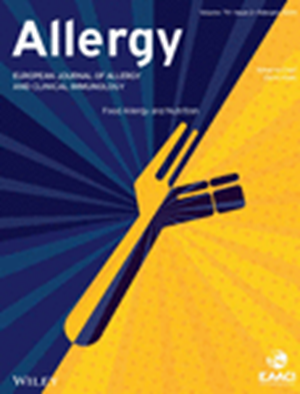Arg16Gly β2-肾上腺素能受体多态性对重度嗜酸性哮喘患者美宝珠单抗长期疗效和临床缓解的影响:一项基因型分层、多中心研究
IF 12
1区 医学
Q1 ALLERGY
引用次数: 0
摘要
β2-肾上腺素能信号促进气道平滑肌松弛并限制免疫细胞释放促炎介质。rs1042713多态性编码甘氨酸-精氨酸取代(Arg16Gly),增强β2受体下调。我们研究了这种多态性与严重嗜酸性粒细胞哮喘风险的关系,以及它对美polizumab长期疗效和临床缓解的影响。方法对接受mepolizumab治疗的102例重度嗜酸性粒细胞性哮喘患者的基因型进行比较,其中31例为轻度哮喘患者,20例为健康对照。对重度哮喘队列进行长达24个月的随访,并在基线以及治疗3、6、12和24个月后收集临床数据。按Arg/Arg、Arg/Gly和Gly/Gly基因型进行分层分析。结果每增加一个Arg16等位基因,重度嗜酸性粒细胞哮喘的发生率比轻度哮喘高2.61倍(95% CI 1.48 ~ 4.59; p = 0.0001),比健康对照组高3.61倍(95% CI 1.78 ~ 7.35; p < 0.0001)。mepolizumab治疗24个月后,与Gly/Gly患者相比,Arg/Arg患者的恶化风险增加(HR 2.3 [95% CI 1.03-5.20]; p = 0.0414),哮喘控制较差(ACT≥20:72.4% vs. 100%, p = 0.0308)。Gly/Gly患者的肺功能下降也较少。到第24个月,每增加一个Gly16等位基因,实现临床缓解的几率增加2.86倍(95% CI 1.20-6.81; p = 0.0170),定义为无年度加重,无OCS, ACT≥20;当包括FEV1较基线下降≤5%时,获得临床缓解的几率增加3.06倍(95% CI 1.34-6.96; p = 0.0080)。结论:rs1042713多态性的Arg16等位基因增加了严重嗜酸性粒细胞哮喘的风险,并可能降低美珠单抗的长期疗效,而Gly16等位基因似乎能带来更好的结果和更高的缓解率。本文章由计算机程序翻译,如有差异,请以英文原文为准。
Effect of the Arg16Gly β2-Adrenergic Receptor Polymorphism on Long-Term Mepolizumab Response and Clinical Remission in Severe Eosinophilic Asthma: A Genotype-Stratified, Multicenter Study.
BACKGROUND
β2-adrenergic signaling promotes airway smooth muscle relaxation and limits the release of pro-inflammatory mediators by immune cells. The rs1042713 polymorphism encodes a glycine-to-arginine substitution (Arg16Gly) that enhances β2-receptor downregulation. We investigated the association of this polymorphism with the risk of severe eosinophilic asthma and its impact on the long-term effectiveness of mepolizumab and clinical remission.
METHODS
Genotypes from 102 patients with severe eosinophilic asthma receiving mepolizumab were compared with those from 31 individuals with mild asthma and 20 healthy controls. The severe-asthma cohort was followed for up to 24 months, and clinical data were collected at baseline and after 3, 6, 12, and 24 months of treatment. Analyses were stratified by Arg/Arg, Arg/Gly, and Gly/Gly genotypes.
RESULTS
Each additional Arg16 allele increased the odds of severe eosinophilic asthma by 2.61-fold (95% CI 1.48-4.59; p = 0.0001) relative to mild asthma and by 3.61-fold (95% CI 1.78-7.35; p < 0.0001) relative to healthy controls. Over 24 months of mepolizumab treatment, Arg/Arg patients had an increased risk of exacerbations (HR 2.3 [95% CI 1.03-5.20]; p = 0.0414) and poorer asthma control compared with Gly/Gly patients (ACT ≥ 20: 72.4% vs. 100%, p = 0.0308). Gly/Gly patients also experienced less decline in lung function. By month 24, each additional Gly16 allele increased the odds of achieving clinical remission by 2.86-fold (95% CI 1.20-6.81; p = 0.0170), defined as no annual exacerbations, no OCS, and ACT ≥ 20, and by 3.06-fold (95% CI 1.34-6.96; p = 0.0080) when including an FEV1 decline ≤ 5% from baseline.
CONCLUSIONS
The Arg16 allele of the rs1042713 polymorphism increases the risk of severe eosinophilic asthma and may reduce the long-term efficacy of mepolizumab, whereas the Gly16 allele appears to confer better outcomes and higher remission rates.
求助全文
通过发布文献求助,成功后即可免费获取论文全文。
去求助
来源期刊

Allergy
医学-过敏
CiteScore
26.10
自引率
9.70%
发文量
393
审稿时长
2 months
期刊介绍:
Allergy is an international and multidisciplinary journal that aims to advance, impact, and communicate all aspects of the discipline of Allergy/Immunology. It publishes original articles, reviews, position papers, guidelines, editorials, news and commentaries, letters to the editors, and correspondences. The journal accepts articles based on their scientific merit and quality.
Allergy seeks to maintain contact between basic and clinical Allergy/Immunology and encourages contributions from contributors and readers from all countries. In addition to its publication, Allergy also provides abstracting and indexing information. Some of the databases that include Allergy abstracts are Abstracts on Hygiene & Communicable Disease, Academic Search Alumni Edition, AgBiotech News & Information, AGRICOLA Database, Biological Abstracts, PubMed Dietary Supplement Subset, and Global Health, among others.
 求助内容:
求助内容: 应助结果提醒方式:
应助结果提醒方式:


